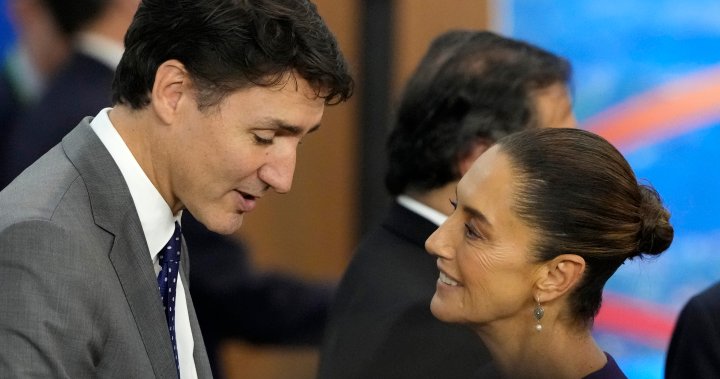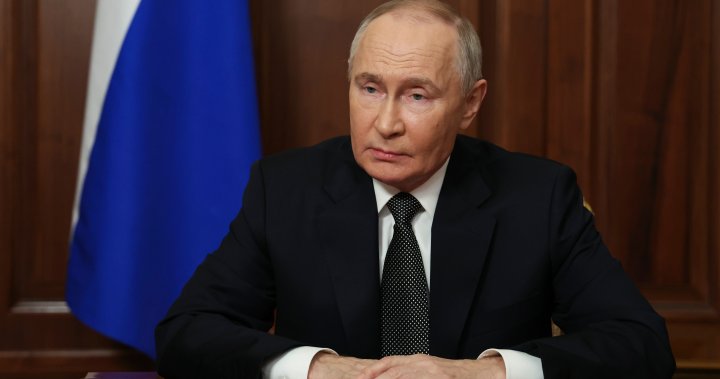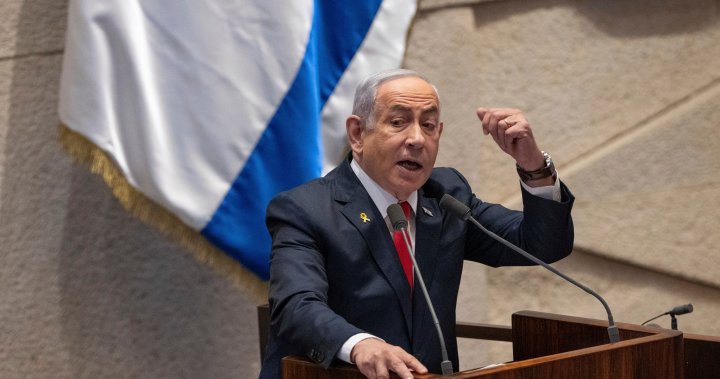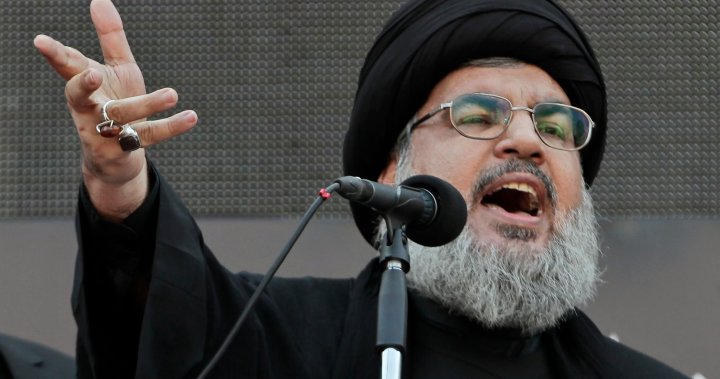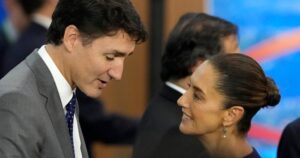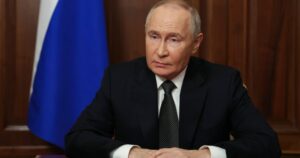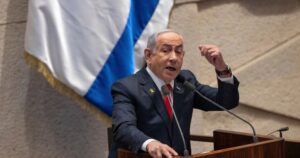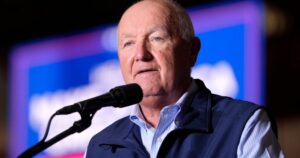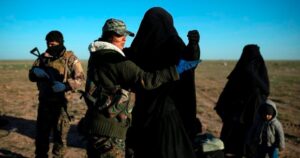The Lebanese Hezbollah group confirmed on Saturday that its leader and one of its founders, Hassan Nasrallah, was killed in an Israeli air strike in Beirut the day before.
A statement on Saturday said that Nasrallah “joined his fellow martyrs.” Hezbollah pledged to “continue jihad against the enemy and in support of Palestine.”
Nasrallah, who led Hezbollah for more than three decades, is the most powerful target Israel has killed during weeks of intense fighting with Hezbollah. The Israeli military said it carried out a precise airstrike on Friday while Hezbollah’s leadership was meeting at its headquarters in the southern suburb of Beirut.
The Lebanese Ministry of Health said that six people were killed and 91 others were injured in the Beirut strikes on Friday that destroyed six residential buildings. The Israeli army said that Ali Karki, commander of Hezbollah’s southern front, and other Hezbollah leaders were killed in the attack.
Story continues below ad
Lt. Col. Nadav Shoshani, a military spokesman, said the airstrike was based on years of tracking Nasrallah along with “real-time information” that made it workable. He added that Nasrallah’s death had been confirmed through various types of intelligence, but he declined to go into details.
Shoshani declined to disclose the munitions used in the raid or provide an estimate of the number of civilians killed in the raid, saying only that Israel takes measures to avoid civilians whenever possible and authorizes strikes in advance with the help of intelligence and legal experts.

A defiant Netanyahu vows to continue attacks on Lebanon and Gaza
Israel pledges to continue attacks on Hezbollah
Israeli Chief of Staff, Lieutenant-General Herzi Halevy, said on Saturday that eliminating Nasrallah “is not the end of our tools,” noting that more strikes were planned. He said that the strike targeting Hezbollah’s leadership was the result of a long period of preparation.
Story continues below ad
It was not immediately clear what effect the strike would have on Hezbollah or the fighting between the two sides that has been going on for nearly a year. Israel pledged to intensify pressure on Hezbollah to stop its attacks, which led to the displacement of tens of thousands of Israelis from communities near the Lebanese border. The recent fighting also displaced more than 200,000 Lebanese in the past week, according to the United Nations.

Get daily national news
Get the day’s top political, economic and current affairs news, headlines, delivered to your inbox once a day.
The army said it had mobilized additional reserve soldiers Tensions escalate with LebanonActivating three battalions of reserve soldiers for service throughout the country. This call comes after two battalions were sent to northern Israel earlier this week to train for a possible ground invasion.
Shoshani, the army spokesman, said that Israel had inflicted severe damage on Hezbollah’s capabilities over the past week by targeting a range of direct threats and strategic weapons, such as larger guided missiles. But he said much of Hezbollah’s arsenal remains intact and that Israel will continue to target the group.
“This is not a threat that has gone away,” he added.
He said it was “safe to assume” that Hezbollah would retaliate and that Israel was “highly prepared.” But he said Israel hopes the strike on Hezbollah will change the course of the war.
“We hope this will change Hezbollah’s actions,” he said. “We were looking for solutions, looking for a change in reality that would bring our civilians back to their homes,” he said, referring to the nearly 60,000 Israelis evacuated from their homes along the Lebanese border nearly a year ago. The Israeli government said earlier this month Stop Hezbollah attacks in the north of the country Allowing residents to return to their homes is an official goal of the war.
Story continues below ad
Iran calls for support for Hezbollah
Iranian state television read Hezbollah’s announcement confirming Nasrallah’s death live, but there was no further comment. Iranian Supreme Leader Ayatollah Ali Khamenei said in a message on Saturday that “the resistance movement, led by Hezbollah, will decide the fate of the region” in a statement read on state television.
He said: “All regional resistance forces must stand by Hezbollah and support it.” He added that Hezbollah is strong enough to resist Israeli attacks. Iran is the main supporter of Lebanese Hezbollah and other armed groups in the region.
Also on Saturday, Iran’s influential parliamentary National Security Committee demanded a “strong” response to Israel following the committee’s meeting. State television also said people held anti-Israel rallies in support of Hezbollah in major cities and towns across the country.
A year of hostilities between Israel and Hezbollah
Hezbollah began firing rockets into Israel in support of Gaza on October 8, a day after Hamas militants launched an unprecedented attack on Israel, killing about 1,200 people and kidnapping 250 others. Since then, both sides have engaged in cross-border attacks. Which gradually escalated and caused the displacement of tens of thousands of civilians on both sides of the border.
Trending now
-

Sean “Diddy” Combs’ lawyer is trying to explain the rapper’s 1,000 bottles of baby oil
-

Former Canadian politician suspected of working for a foreign government: CSIS
Hostilities escalated dramatically last week when thousands of explosives hidden in pagers and walkie-talkies used by Hezbollah exploded, killing dozens of people and wounding thousands, including many civilians, with serious eye, face and limb injuries. It is widely believed that Israel is behind the attack. Israel also killed several senior Hezbollah leaders in Beirut, in addition to the attack that killed Nasrallah.
Story continues below ad

Israel-Hezbollah: An expert warns against changing the threshold of war after pager explosions in Lebanon
A window of opportunity for Israel and Lebanon
Orna Mizrahi, a senior researcher at the Tel Aviv-based Institute for National Security Studies and a former intelligence analyst for the Israeli military and the Prime Minister’s Office, said Nasrallah’s death is a “historic moment.” She added: “This does not mean that Hezbollah has been destroyed, because Hezbollah consists of tens of thousands of people.”
Mizrahi noted that Nasrallah was at times a “voice of reason,” concerned with engaging Israel in a war of attrition and preventing the militant group from using the full force of its massive arsenal against Israel. She said Nasrallah’s death could prompt some of Hezbollah’s less important members to unleash weapons far more powerful than those used in the nearly year-long tit-for-tat hostilities between Hezbollah and Lebanon. Mizrahi said the biggest question mark now is how Iran will respond.
Story continues below ad
Mizrahi added that Nasrallah’s death could provide a window of opportunity, while greatly weakening the organization, for Lebanon to dilute Hezbollah’s far-reaching influence, especially in the south, which threatens to drag Lebanon into a full-scale war with Israel.
Continued strikes on both sides of the border
On Saturday morning, the Israeli army carried out more than 140 air strikes in southern Beirut and the Bekaa Valley in eastern Lebanon, including targeting an anti-ship missile storage facility in the suburb of Beirut. Israel said the missiles were stored underground under civilian residential buildings. Hezbollah fired dozens of shells across northern and central Israel and deep into the Israeli-occupied West Bank, damaging some buildings in the northern town of Safed.
In the southern suburb of Beirut, smoke rose and the streets became empty after the area was subjected to intense Israeli air strikes at night. The shelters set up in the city center for the displaced were crowded. Many families were sleeping in public squares, beaches, or in their cars. On the roads leading to the mountains overlooking the capital, hundreds of people were seen going out on foot, carrying infants and whatever possessions they could carry.
At least 720 people were killed in Lebanon over the past week due to Israeli air strikes, according to the Ministry of Health.

